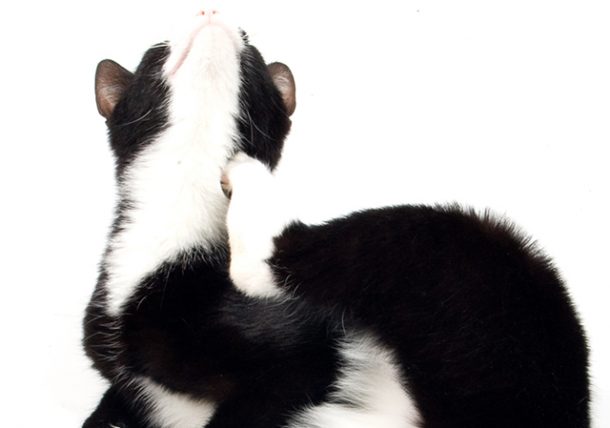Itching and Hair Loss in Cats

Skin disease can be a frustrating problem for both cat owners and veterinarians. Itching and subsequent hair loss are just a few of the observed complications from feline skin diseases. Cats can suffer from a number of ailments that lead to the spiral of excessive grooming, scab lesions, raw spots, facial or ears crusts and more.
Allergies to Fleas and Mosquitoes
Cats are excellent groomers and often groom any live fleas or flea “dirt” (flea feces) off of their bodies. It is extremely important to keep cats indoors, implement environmental flea control such as extermination or bug foggers and use a monthly topical flea control product on every dog and cat in the household. Be sure to remove your cat from the premises or keep it away from the chemicals until they are dry and it is safe to return.
“The vast majority of itchy cats that [veterinarians] see are going to be flea-allergic,” said Rudayna Ghubash, DVM, who is board-certified in veterinary dermatology. Many cats are allergic to the flea saliva caused by just one flea bite. Cats with skin disease on their ears, noses and paws can have mosquito bite hypersensitivity.
Parasites
The majority of skin and ear parasites, such as Demodex, Notoedres and Otodectes, most commonly occur in cats less than 12 months of age since kittens have an immature immune system; however, they can occur at any age. Your veterinarian will perform tests including skin scraping and an ear cytology (swab) to check for these mites.
Infection
The fungal infection ringworm or dermatophytosis is the “great mimicker,” as it can imitate any other dermatologic disease. Your veterinarian will pluck hairs from your cat and put them in dermatophyte test medium (DTM) culture (the most accurate test) to see if the fungus will grow. Your veterinarians also may shine a special fluorescent light on your cat’s fur as a screening test known as the Wood lamp examination. Your veterinarian also may perform a skin cytology, taking an impression of your cat’s skin and nails to screen for bacterial or Malassezia (yeast) infection.
Seasonal Allergy and Food Allergy
Atopy (allergy to dust, pollen, weeds, mold, grass, etc.) is very common and usually has a seasonal pattern. There are a variety of treatment options available if your cat has atopic dermatitis. Much less common is the fact that some cats develop an allergy to a food like chicken, beef or fish that they have been eating for several years. Grain-free is not considered hypoallergenic. Dr. Ghubash states that changing your cat’s diet to a “novel” (new) protein/carbohydrate source via a veterinary-therapeutic diet for 12 weeks is the only accurate way to diagnose food allergies. Dr. Ghubash does not recommend an over-the-counter diet for a food trial because food companies use the same equipment to produce different brands of foods.
Autoimmune Disease
Sometimes the cat’s immune system can attack itself, mainly showing red, raw, crusty skin lesions on the ears (a “shake-and-bake” appearance, according to Dr. Ghubash), nails and abdomen. If your cat has a skin problem, talk with your veterinarian about fleas and diagnostic testing (skin scraping, DTM, Woods lamp examination, skin cytology) to get to the root of the problem. To diagnose an autoimmune problem, your veterinarian will take small skin biopsies and send them to a veterinary pathologist to determine the underlying problem. Some of these samples also may be submitted for culture in case some atypical bacteria are involved. The appropriate treatment plan will be formulated based on the results of the pathology and/or culture.
Resources:
Ghubash R. The idiosyncrasies of itchy cats. Vetted. July 2016; 34-36.
Molly Price, DVM, is a graduate of Texas A&M University College of Veterinary Medicine who lives in Allen, Texas. She is a relief veterinarian and is enthusiastic about educating clients and staff members.


Hi I have a cat that is almost 6 years old and he is listing his fur from fleas what should I do to help him
I wish I could send a pic of my can. I feel so dad from him his name is,Oreo. His ears are so bad with fever redness itchy n he gets all day. I’ve not annual annual bacteria itching pain relief ointment I’m hoping it soothes it. I need to get my cat help desperately I’m a disabled girl with one leg in a wheelchair and live on my own. I feel so helpless for my cat I’m asking for help what can I do. I don’t have the funds to take him to the vet I am so scared that he might pass away from the infection of whatever he has. At first I thought it was ear mites and I bought ear Mite medicine and it just got worse. I’m praying to God I did not hurt my cat but giving him that might ear medicine that’s when it all started. Please help me thank you very much!
I’d like to own thick hair when I had been a youngster, however today it’s falling out
in clumps in an alarming pace. My son resists obtaining a hair cut too,
but I usually get it done in our own kitchen. After I shave my own son’s mind, ” he likes the feel of their hair when he touches it.
And it makes becoming prepared in the evenings much easier.
My cat is itching and having bald spot all over he doesn’t have flea I took him to the vet and she say he is stress …he no still eats hardly wants to go outside